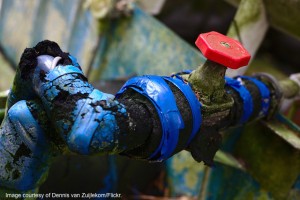
Main
How to Prevent Frozen Pipes this Winter
When the temperatures drop your pipes are in danger of freezing. Frozen pipes, broken appliances, burst pipes and flooding can put a damper on holiday celebrations, so preventing freezing in the first place is the best way to make sure things go smoothly.
Insulate Exposed Pipes
Exposed pipes under sinks or in attics or basements should be insulated. Insulation is easy to install and will help keep your pipes above freezing temperature. If your pipes’ insulation is cracked or worn, it’s time to replace it. This simple project can save you from frozen or burst pipes and a major headache.
Open Cupboard Doors
When it gets very cold, you may want to leave cupboard doors open to let warm air from your home circulate around these pipes for added protection. In especially frigid conditions, you can also let just a trickle of cold water run through the faucet and pipes. You’ll want to do this sparingly to avoid increasing your water bill, but this step can help in especially cold weather.
Carefully Use a Space Heater
If the area around exposed pipes isn’t warming up when you open cupboard doors, set up a space heater a few feet away from the pipes. In most cases, you can keep the heater on a lower setting, since you aren’t trying to heat the area, you are just trying to prevent freezing. Be sure to use a heater with safety features and keep cords out of high-traffic areas.
Drain Water Where Possible
Drain the water out of sprinklers, swimming pools, cooling units, outdoor hoses and anything else you won’t be using during the winter. Follow the directions that came with the appliance to make sure you do this safely and correctly.
Close the Garage Door
If you have exposed pipes or water supply lines in your garage, keep the door closed as much as possible. This can help keep the temperature a little higher to prevent the water lines from freezing.
Keep Your Thermostat set Higher
When the temperatures are very low, keep your thermostat up a little higher, even at night, to keep your home warmer and help prevent frozen pipes. American Red Cross recommends setting your thermostat to 55 degrees or higher if you go out of town.
Repair Appliances
Make sure appliances are in good repair this winter to avoid further damage. We specialize in appliance and boiler repair on Long Island and can help you get your fixtures in good shape before winter sets in.
Know How to Thaw Frozen Pipes
If your pipes do freeze this winter, knowing how to thaw them safely can save you from frustration and even more damage. First, check exposed pipes for bulges or breaks. If you don’t see any problems, open the faucet and use a blow drier to slowly thaw the pipe. If you do see damage, the pipe isn’t exposed or you can’t thaw it, contact a plumber right away.
These tips can help prevent frozen pipes this winter so you can avoid expensive damage. If your pipes do freeze or you need expert assistance, contact us. We offer appliance repair, leak detection and repair and boiler repair on Long Island.







